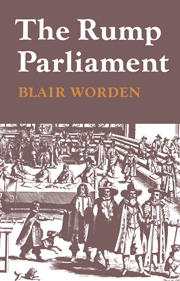Book contents
- Frontmatter
- Contents
- Dedication
- Acknowledgements
- Author's Note
- List of abbreviations
- Introduction
- PART ONE THE RUMP AND THE RUMPERS
- PART TWO THE RUMP AND REFORM
- PART THREE THE STRUGGLE FOR SURVIVAL, FEBRUARY 1649–SEPTEMBER 1651
- PART FOUR PARLIAMENT versus THE ARMY, SEPTEMBER 1651–APRIL 1653
- PART FIVE THE DISSOLUTION OF THE RUMP
- APPENDICES
- Bibliographical Guide
- Index
- Frontmatter
- Contents
- Dedication
- Acknowledgements
- Author's Note
- List of abbreviations
- Introduction
- PART ONE THE RUMP AND THE RUMPERS
- PART TWO THE RUMP AND REFORM
- PART THREE THE STRUGGLE FOR SURVIVAL, FEBRUARY 1649–SEPTEMBER 1651
- PART FOUR PARLIAMENT versus THE ARMY, SEPTEMBER 1651–APRIL 1653
- PART FIVE THE DISSOLUTION OF THE RUMP
- APPENDICES
- Bibliographical Guide
- Index
Summary
On the evening of 19 April 1653, Oliver Cromwell convened a meeting between representatives of the House of Commons and leading army officers at his lodgings in Whitehall. The subject discussed was a bill concerning parliamentary elections, a measure which the House intended to pass the following morning in the face of strong opposition from the army. There was little chance of agreement at the meeting, where tempers soon deteriorated; but Cromwell, using his position as both member of parliament and Lord General, pressed hard for a compromise. When the gathering dispersed, he believed that he had secured an undertaking from the most influential M.P.s to postpone completion of the bill until further talks with the officers had been held. He was therefore surprised to learn, next morning, that parliament was proceeding with the measure ‘with all the eagerness [it] could’. Once the news was confirmed he left for Westminster, where he stationed a troop of musketeers at the door of the Commons before entering and taking his seat. For a while he listened quietly to the debate. Then, as the House prepared to put the motion, he rose to intervene. Pacing the floor, he delivered one of the most extraordinary speeches of his career. Bulstrode Whitelocke, who was among the members present, recorded the scene in an unusually vivid passage of his journal. The angry protest drawn by this unparliamentary language was silenced by the appearance of Cromwell's musketeers, who met little resistance in clearing the chamber.
- Type
- Chapter
- Information
- The Rump Parliament 1648–53 , pp. 1 - 20Publisher: Cambridge University PressPrint publication year: 1974

